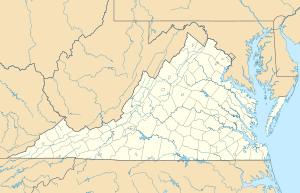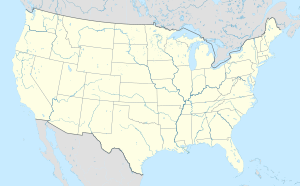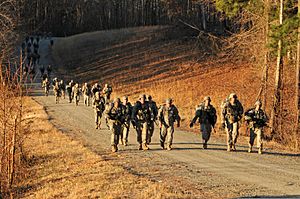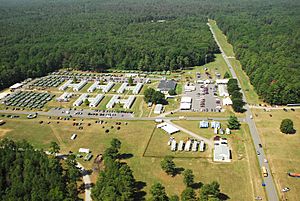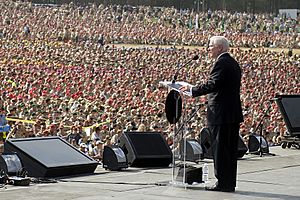Fort Walker facts for kids
Quick facts for kids Fort Walker Regional Training Center |
|
|---|---|
| Caroline County, Virginia | |
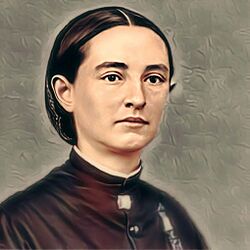
Mary Edwards Walker, first woman Army surgeon and Medal of Honor recipient. Eponym for Fort Walker.
|
|
|
Location of Fort Walker
|
|
| Coordinates | 38°07′04″N 77°16′35″W / 38.11778°N 77.27639°W |
| Type | Military base |
| Site information | |
| Controlled by | |
| Site history | |
| Built | 11 June 1941 |
| In use | 1941—present |
| Garrison information | |
| Current commander |
Lieutenant Colonel Jason P. Duffy |
| Past commanders |
Lieutenant Colonel Andrew Q. Jordan Lieutenant Colonel David A. Meyer Lieutenant Colonel Peter E. Dargle Lieutenant Colonel John W. Haefner Lieutenant Colonel Michael S. Graese Lieutenant Colonel James M. Mis Lieutenant Colonel James B. Balocki Lieutenant Colonel Michael E. Gates Lieutenant Colonel Andrew P. Aswell |
Fort Walker, once known as Fort A.P. Hill, is a special training place for the United States Army. It is located near Bowling Green, Virginia. This center is like a big classroom and playground for soldiers. Here, different parts of the U.S. Armed Forces come to practice their skills, especially with weapons. It's not attached to a regular army base, so units from all over can come here to train.
When units come to train, they work with different offices at Fort Walker. These offices help make sure training is safe and organized.
You won't find a big store or grocery store right at Fort Walker. Soldiers can drive about 40 minutes to Fort Belvoir for a Post Exchange (PX) or Commissary (grocery store). They can also order things online and have them sent to Fort Walker.
Big military planes like C-17s and C-130s can land at the Fort Walker Airstrip. There are also special areas for paratroopers to jump out of planes.
Contents
History of Fort Walker
In 1940, the U.S. Army needed a huge area to train a new, large army of four million men. They wanted to be ready for big operations around the world. In July 1940, they started looking for a large piece of land, about 60,000 acres (243 square kilometers), somewhere between the Potomac River and the upper Chesapeake Bay.
In September 1940, Lieutenant Colonel Oliver Marston, an artillery officer, looked closely at the Bowling Green, Virginia area. He really liked the site in Caroline County. So, the War Department decided to buy it. This new training area ended up being 77,332 acres (313 square kilometers). It had places for 74 officers and 858 enlisted personnel to stay.
The training facility officially opened on June 11, 1941. In its first year, it was used for training large groups of soldiers, including three National Guard divisions. In late 1942, Fort A.P. Hill became a gathering point for Major General George S. Patton’s troops. These troops were part of the Allied invasion of French North Africa during World War II.
During the early years of World War II, the fort continued to be a major training site. Starting in 1944, it also provided field training for future officers and new soldiers from nearby bases like Fort Lee, Eustis, and Belvoir.
In 1952, during the Korean War, the base was called Camp A.P. Hill. It was a main gathering spot for units heading to Europe. This included the VII Corps Headquarters. During the Vietnam War, it was the main center for the Engineer Officer Candidate School, training students from Fort Belvoir.
A new training center for Explosive Ordnance Disposal (EOD) was finished in July 2011. The first class started on October 17, 2011. It is named after Captain Jason McMahon, who died in Afghanistan in 2010. This center teaches soldiers advanced skills for dealing with explosives.
The U.S. Army Asymmetric Warfare Group opened its $90.1 million training center on January 24, 2014. This large training area, about 300 acres (1.2 square kilometers), has many facilities. It includes barracks, offices, training areas, and even an urban training area that looks like a city. It also has a 12-mile (19 km) driving range and shooting ranges. This center helps different branches of the U.S. Armed Forces train together. It has also hosted training for soldiers from other countries.
Renaming Fort Walker
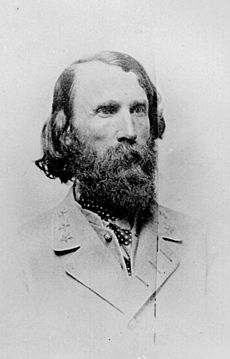
The installation was originally named after Lieutenant General A. P. Hill, a Virginia native who served in the Confederate Army. Fort A.P. Hill was one of the U.S. Army installations named for Confederate soldiers that a special commission recommended renaming.
The commission suggested renaming the post Fort Walker, after Mary Edwards Walker. She was an American abolitionist and a surgeon during the Civil War. She was also the first woman Army surgeon and received the Medal of Honor.
On January 5, 2023, William A. LaPlante, a top defense official, ordered that all the renaming recommendations be put into action. The post was officially renamed Fort Walker on August 25, 2023.
Robotic Anti-Mine Exercise
On June 12, 2024, the U.S. Army Combat Capabilities Development Command (CCDC) C5ISR showed off new anti-mine technology. This happened during a robotic exercise at Fort Walker, where robots were used to clear paths safely.
Fort Walker Organization
The Fort Walker base currently includes these important groups:
- Directorate of Emergency Services (handles emergencies)
- Directorate of Family and MWR (supports families and morale)
- Directorate of Plans, Training, Mobilization, and Security (plans training and safety)
- Regional Training Support Center (helps with training equipment)
- Plans, Analysis and Integration Office (helps with planning and analysis)
- Directorate of Public Works (manages buildings and grounds)
- Directorate of Resource Management (manages money and resources)
- Installation Safety Office (makes sure everyone is safe)
- Sustainable Range Program (manages training areas responsibly)
Training Activities
Fort Walker is used all year long for military training. Soldiers from the U.S. Army, U.S. Navy, U.S. Marine Corps, and U.S. Air Force train here. This includes both active-duty troops and reserve units.
Future officers from Reserve Officers' Training Corps (ROTC) programs also train here. In addition, other government agencies use the fort for training. These include the Departments of State and Interior, U.S. Customs and Border Protection, and various federal, state, and local security and law enforcement agencies.
Boy Scouts of America National Jamborees
Fort Walker was a very popular place for the Boy Scouts of America National Scout Jamboree. A Jamboree is a huge gathering of Boy Scouts from all over the country. Fort Walker hosted this big event many times: in 1981, 1985, 1989, 1993, 1997, 2001, 2005, and 2010.
Each time, about 35,000 Boy Scouts and 250,000 visitors came to the fort! In 2013, the Boy Scouts moved the Jamboree to its new permanent home. This new home is called the Summit Bechtel Reserve high adventure camp in Fayette County, West Virginia.
Fort Walker in the Media
An episode of the TV show What on Earth? featured Fort Walker. The episode was called "Zombietown USA" and first aired on the Discovery Channel on August 27, 2020.
 | Bessie Coleman |
 | Spann Watson |
 | Jill E. Brown |
 | Sherman W. White |


